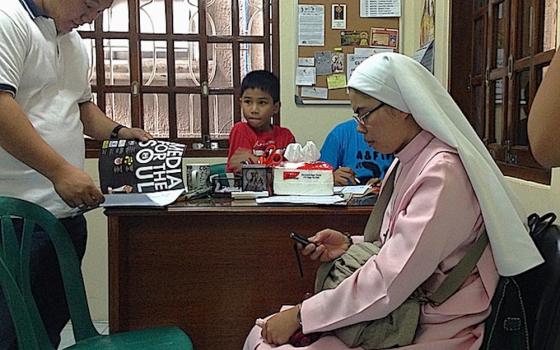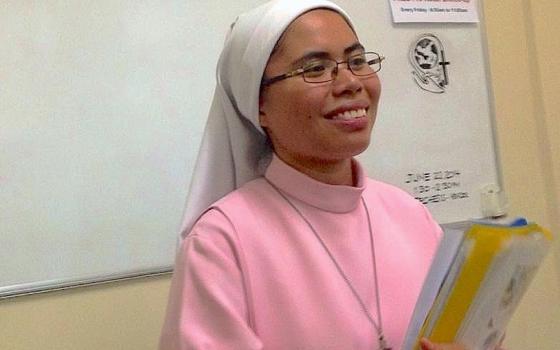In a red-light district in Cebu, central Philippines, the taxi stopped when its passenger called out, “There, that girl,” pointing to one of the women standing in the line along the road in Camagayan community. His choice of sex partner, however, is a nun.
"No, she's not one of us," the pimp answered the man in the taxi. The chosen woman is a member of Mary Queen of Heaven Missionaries (MQHM), who was with a few other nuns and volunteers talking to women sex workers in the street while they waited for customers.
These "rescue operations," teams of two to six nuns and volunteer lay people, are part of the apostolate to reach out to prostituted women and girls in Philippine cities and towns and to establish contact with them by distributing rosaries, scapulars and missionaries' phone numbers so those who want help can contact them.
The group's foundress, Corazon Salazar, started the apostolate in Cebu in 1996 as a laywoman. In 2000, now retired Cardinal Ricardo Vidal, then archbishop of Cebu, formally established the Institute of Mary Queen of Heaven Missionaries as a Catholic Association of the faithful. Three years later, he canonically erected it as a Public Association of the Faithful with Salazar, a professed sister by then, as founding superior. Its work has since expanded to other cities and towns, including this city of Marikina, northeast of Manila. MQHM nuns are also based in California.
In the Philippines, sisters are going around select dioceses introducing their work and inviting church members to join their efforts "because the work is too big and we are just few sisters in the whole country," junior Sr. Joy Culaniban told some 20 leaders and workers in the social service and other ministries of Our Lady of the Abandoned parish here.
She explained her order's work in the context of the spirituality and charism of the heart of the Good Shepherd. "We seek the lost and fallen by the wayside, and work to bring them back to the bosom of the Father so that there may be one flock under one shepherd," Culaniban said in what she called an "echo" session.
Aside from rescuing women and children victims, however, the nuns also work to shelter and rehabilitate those who ask their help to transition to a life free of drugs, sex and other harms.
Prostitution’s prevalence
Prostitution as defined by Philippine law, refers to any act, transaction, scheme or design involving the use of a person by another, for sexual intercourse or lascivious conduct in exchange for money, profit or any other consideration.
Though illegal in the Philippines, prostitution has been shown to be prevalent, with the number of prostituted persons in the country estimated to have reached 800,000 in 2009, half of them children, according to a report by the Philippine Commission on Women.
In 2005 the association of missionary sisters, looking to deepen its reach and response to the problem, conducted its own survey of the situation of prostitution in various Philippines cities and towns. The conclusion: Poverty and ignorance leave women and children, female and male, prey to pimps and other sex industry operators, said Sr. Clare Pedoche, who heads the group's community in the Diocese of Pasig, northeast of Manila.
Pedoche told GSR in early June the National Capital Region, which groups 15 cities and one town around the center of national government including Manila, had the highest percentage of the population engaged in prostitution. Cebu City, ranked second in this aspect, was followed by Pampanga province near where the U.S. bases operated.
MQHM sisters have been going out to them at night in red-light districts, bars, brothels and videoke bars. In recent years, sisters have also detected what they call "mobile bars." These temporary structures sprout in agricultural communities during the rice harvest season, usually around April and May, and then disappear, Pedoche said. "We discovered this with the help of Bishop Jose Rojas of Libmanan when he invited our nuns to work in his diocese of Libmanan," in Camarines Sur province southeast of Manila.
Rescue operations
Two or three times a week at around 6 p.m., small groups gather at the Pasig center of MQHM, dressed in their mid-calf skirts and modest blouses pinned with their wooden crucifixes, and say prayers together before heading out. "We pray that the precious blood of Jesus would shield us and be our protection against risks, and guide us," Pedoche explained. Coming home from a rescue operation, the nuns and other lay partners also say cleansing prayers.
They go into bars and brothels “not to judge these women who work there, but to reach out to them and offer them a way out of prostitution should they want to get out," Pedoche told GSR. The nuns do not directly tell the women their job is bad. "We listen a lot – and hard. We offer them a shoulder to cry on . . . we try to make them feel God's love for all, even those who sin."
At each sex den, the assigned team member first asks the bar manager or owner for permission to visit with women workers. She tells bar officials her group of missionaries will give out free rosaries and scapulars to the women, along with leaflets on how to pray the rosary.
"We work differently from other NGOs reaching out to prostitutes. We don't pay the bar fine, we don't pay at the door, we wear our long skirts and blouses," Pedoche pointed out.
Arriving at the bars ahead of the crowd, they catch the women huddled inside rooms putting on make-up or just coming out of the bathroom. Some bar owners or managers bring them to the VIP rooms where it is more private to talk with the women.
At brothels, they aim to arrive before 3 p.m. since women go on display to customers around that time and cannot be disturbed.
Way out through healing, rehabilitation, re-integration
Women who ask for help for leaving prostitution are placed in the shelter called Home of Love in Cebu where they may stay up to about five years in a place that aims to provide an ambience of a happy family, Culaniban told parish workers. The home provides simple, nutritious food, other basic health care, individual and group counseling and therapies.
Residents are taught skills as part of therapy or as a form of livelihood assistance. Some return to formal schooling and move on to jobs after graduation. Most are brought back to their homes by a staff or member of the programs and are monitored through home visits as part of the reintegration program
Children of the women are welcomed in the home where the residents are taught parenting skills; people who want to adopt the children, many of whom are of mixed nationalities, are refused. "One of our responsibilities is to help [the parents] realize that they have the responsibility to be mother and father to their children. We don't allow adoption," Pedoche said. She remembers that only one out of more than 100 women who have lived in the home took off and left her child behind.
'Everyone a victim’
From the nuns’ perspective, women in the sex trade are victimized even when they consent to their job arrangements. "Even if they say they work there [bars, brothels] by choice or they've been legally recruited and have consented to dance or even do sexual acts with customers, we found that they are victims of issues in their families – in their view of their self, psychological issues – and are being victimized by people exploiting all these by misguiding them and using them in the sex trade to make money,” Pedoche said.
She said all the women in this trade whom she has encountered "come from a dysfunctional or broken family.” Frequently parents are separated and these women are left with no family guidance; their gang of friends becomes their main support. Bars readily accept women workers who have very few professional qualifications. Usually all they need to have is a "pleasing personality," and managers or owners vigilantly persuade those who do.
Many were young when first victimized. One of the women who took shelter in Home of Love, Marsha (not her real name), said she had been used by her father for sex since she was 6 years old. Her parents separated, and her father took her to live in a remote area. "I didn't know that my father was raping me," she told the nuns. "I thought that was the daughter's role, so when I saw on TV at a classmate's house a show talking about a father making his young daughter have sexual intercourse with him as rape, I ran away. I was 12 years old when I got a job in a bar in Mandawe City. Later that year, I gave birth to my first child."
Preventing prostitution
Pedoche said her association cannot stop at curative measures because the lure of prostitution and human trafficking is very strong among the poor. One evening a team rescued two women and learned that by the next morning three new ones had joined the club they left.
The nuns' strategy includes preventive measures focused on fighting effects of poverty, "since poverty is the root cause of prostitution in our country," Pedoche said. Education support is focused on women in rural areas where 99 percent of women and children in prostitution are reportedly from.
The program provides school supplies and other school needs to children in mountains in Cebu, Negros, Iloilo, Samar and various provinces in the Bicol region. Pedoche reports that there have been no new cases of prostitution in Oslob since her association launched its pilot education support program there.
Vocation, compassion, passion for justice
Pedoche expressed gratitude for the exposure she is able to get to prostituted women in their places of work. "If I hadn't become a nun, I wouldn't be able to go inside a bar, see the situation of women – much less talk to sex workers about their life and work," the social worker nun said.
She remembers powerful encounters in her ministry. "Once, while I was talking to a strip teaser, she spoke candidly about her past and her present life and began to cry, but someone signaled that it was her turn to dance. She told me, 'Sister, I want to talk to you some more, but it's my turn to dance. Please, please wait for me, Sister.'"
Pedoche stayed through the number, as she promised the dancer. "I prayed as she peeled off her clothes one piece at a time. I also watched reactions of men. The women were really just like toys. It looked like the women were nothing to them. I could see in the face of the woman she was tortured inside while dancing," the nun said. “She had told me she dances in the nude to earn money to feed her family and pay for her sick parents' hospital bills.
"It's almost the same story over and over. Everyone we talked to spoke to us about pain and their problems. So we cannot just point a finger and condemn these women for just wanting fast money. Not everyone is like that."
Among "worst stories" she has heard was from a woman talking about a time when she was told that two or three people had hired her for a high fee. When she got to the VIP room of the bar, there was a group of 10 men who had her perform oral sex on all of them. "It was heart rending and also sickening to listen to details of her experience,” Pedoche said. “I wonder how they survive these experiences, night by night.” She remembers crying after listening to this client. "I just prayed, Lord, please help me to handle this," the nun said.
It was even more upsetting for her to know the bar owner knew there would be 10 and not just a few men as the woman was told. "They connived because the bar owner usually gets 60 percent of the fees for the women. Even if she consented, the woman is a victim.”
At Home of Love, where Pedoche lived and served for three years, the nuns take time to pray separately from the residents. "We have to have that daily prayer time because we cannot take the pressure without God,” Pedoche said. “It's only by God's grace that we can understand them. I cannot understand on my own. We have a tendency to judge, and your patience gets tested.”
After 18 years in the association, she is far more aware and emotionally prepared than the 20-year-old third-year commerce student she was when she started with the MQHM. She is also grateful to God for the rich vocations to the association, averaging 10 aspirants each year.
[N.J. Viehland is a correspondent for Global Sisters Report and NCR based in the Philippines.]


